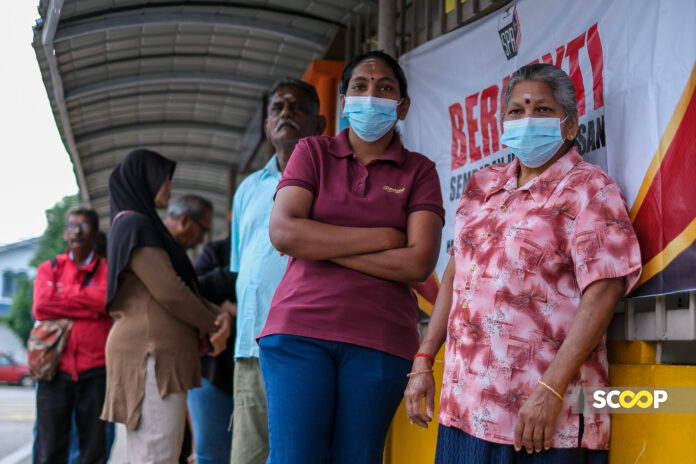
GEORGE TOWN — The Indian community in Penang has long been a reliable voting base for Pakatan Harapan (PH), which has governed the state since 2008 and is now in its fourth term.
However, there are signs that this support is waning, as seen in the low turnout of Indian voters in the 2023 state elections and the Sg Bakap by-election.
These elections resulted in PH losing seats to Perikatan Nasional (PN), a trend also witnessed in other parts of the country.
Indian voters, when speaking with Scoop, say that if PH wants their votes in the upcoming GE16, it needs to address the rising cost of living and commit to allocating more federal funds to improve the community’s socio-economic well-being.
Raja, a 46-year-old Benggali bread seller, has consistently voted for PH since 2008 (when it was known as Pakatan Rakyat).
However, he shared with Scoop that he would consider sitting out the next election if the government fails to tackle inflation.
“What else can I do (other than sitting out the election?) Vote for PAS?” he asked, frustrated by the rising prices of raw materials that have forced him to increase his bread prices — a move that has drawn complaints from his customers.
“They keep increasing the prices. Do you know how hard it is for our businesses? We are the ones facing public scorn,” he lamented.
Raja attributes food inflation and fuel subsidy reforms as key reasons why the Indian community is distancing itself from PH and Prime Minister Datuk Seri Anwar Ibrahim, who also leads the coalition.
“Can they do well when they touch rice prices?” he asked.
A 2023 post-state election study by analyst Bridget Welsh, as reported by FMT, found that Indian votes for PH had dropped by 21%, 19%, and 12% in Negeri Sembilan, Penang, and Selangor, respectively.
In contrast, Indian votes for PN increased by 29%, 19%, and 14% in those states.
Vote PH and get expensive goods?
Echoing Raja’s concerns about the cost of living is 24-year-old polytechnic graduate Muhammad Syakir Burukhanudin, who said Indian youths are deeply concerned about inflation as they begin their careers, get married, and start families.

Syakir recalled conversations with his friends during the 2023 Penang state elections.
“They were afraid that if PH came into power, the prices of goods would go up. But if they vote for PN, maybe the prices will remain stable,” he said.
Syakir and his peers are worried about higher living costs and education loans, especially with low starting salaries.
Asked how he and his peers would vote in GE16, Syakir said inflation would be their primary deciding factor.
“If voting for PH leads to higher prices, maybe we’ll vote for PN. We’re very concerned about the economy,” he said.
Meanwhile, 59-year-old Devi (not her real name), a parking lot ticket seller in Bukit Mertajam, expressed concern about the lack of proper wage increases for workers like herself and dishwashers in kopitiams.
She earns only RM30 a day, and wage raises are often given arbitrarily by employers instead of mandated increases.
“No political parties are fighting for wage raises for workers like us. In GE16, I’ll vote only for parties that support wage hikes for us,” she said.
Racial sentiment, education rights
For some Indian voters, issues related to racial interests and educational rights are also contributing to their shift away from PH.
J. Kishen Kumar, 31, an engineer from Bukit Mertajam, said a 2023 incident involving Anwar’s response to an Indian matriculation student’s question about enrollment discrimination left him disillusioned.
“If Singapore can provide equal education, why not Malaysia? If PH doesn’t improve race relations and educational opportunities, I’ll sit out GE16,” he told Scoop.
Kishen is also disappointed with PH for not opposing the removal of the Primary School Achievement Test (UPSR) and Form Three Assessment (PT3) exams, which he believes are crucial to assessing students’ academic preparedness.
These exams were abolished in 2021 and 2022 by governments led by PN and Barisan Nasional (BN).
“They should have opposed the previous government’s decision. Instead, they just don’t hold exams that prepare students until Form 5,” he said, criticising the unreliability of the Classroom-Based Assessment due to teacher bias.
More allocations for Indians
When asked what PH should do at the federal level to prevent more Indian voters from shifting to PN, Syakir suggested that PH implement policies to help youths cope with inflation, such as offering more cash aid in the coming years.
Kishen, on the other hand, recommended that PH commit to increasing allocations for Tamil schools and the Malaysian Indian Transformation Unit (Mitra).
“Full equality may never be achieved, but the government needs to do its best to provide more for the non-Malay communities in national budgets,” he said. — January 7, 2025



